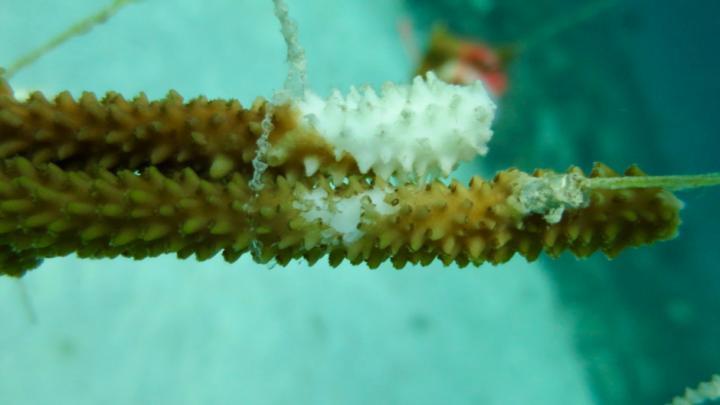Elkhorn coral actively fighting off diseases on reef, study finds

Disease transmission.
Photo: Margaret Miller, SECORE International
Findings showed coral has core immune response regardless of disease type.
As the world enters a next wave of the ongoing COVID-19 pandemic, we are aware now more than ever of the importance of a healthy immune system to protect ourselves from disease. This is not only true for humans but corals too, which are in an ongoing battle to ward off deadly diseases spreading on a reef.
A new study led by researchers at the University of Miami (UM) Rosenstiel School of Marine and Atmospheric Science looked at the immune system of elkhorn coral (Acropora palmata), an important reef-building coral in the Caribbean, to better understand its response to diseases such as white band disease and rapid tissue loss.
In the experiment, healthy corals were grafted to diseased ones. After one week, the corals were analyzed to study the coral’s overall gene expression in response to disease, if they exhibited an immune response, and whether there were different signatures of gene expression for corals that didn’t show signs of disease transmission. The researchers found that A. palmata has a core immune response to disease regardless of the type of disease, indicating that this particular coral species mounts an immune response to disease exposure despite differences in the disease type and virulence.
“Our results show that elkhorn coral is not immunocompromised but instead is actually actively trying to fight off disease,” said Nikki Traylor-Knowles, an assistant professor of marine biology and ecology at the UM Rosenstiel School and senior author of the study. “This gives me hope that the corals are fighting back with their immune system.”
Based upon these findings, the researchers suggest that corals that did not get disease may have tougher epithelia, a protective layer of cells covering external surfaces of their body. And, that the symbiotic dinoflagellate, Symbiodiniaceae, that live inside corals did not have differences in gene expression in response to disease, but over the course of the two-year study did develop differences.
Coral disease is considered one of the major causes of coral mortality and disease outbreaks are expected to increase in frequency and severity due to climate change and other man-made stressors. The Caribbean branching coral Acropora palmata which has already seen an 80 percent decrease on reefs primarily due to disease, which has resulted in them being classified as threatened under the US Endangered Species Act.
“These corals are keystone species for Florida reefs, so understanding that their immune systems are active is an important component that can be useful for protecting reefs,” said Traylor-Knowles.
###
The study, titled “Innate immune gene expression in Acropora palmata is consistent despite variance in yearly disease events,” was published October 22, 2020 in the journal PLoS One. The study’s coauthors include: Ben Young and Nikki Traylor-Knowles of the UM Rosenstiel School; Former UM student Xaymara Serrano from NOAA’s Atlantic Oceanographic and Meteorological Laboratory; Stephanie Rosales from NOAA’s Cooperative Institute for Marine and Atmospheric Studies; Margaret Miller from SECORE International and Dana Williams from NOAA’s Southeast Fisheries Science Center.
Media Contact
All latest news from the category: Life Sciences and Chemistry
Articles and reports from the Life Sciences and chemistry area deal with applied and basic research into modern biology, chemistry and human medicine.
Valuable information can be found on a range of life sciences fields including bacteriology, biochemistry, bionics, bioinformatics, biophysics, biotechnology, genetics, geobotany, human biology, marine biology, microbiology, molecular biology, cellular biology, zoology, bioinorganic chemistry, microchemistry and environmental chemistry.
Newest articles

An Endless Loop: How Some Bacteria Evolve Along With the Seasons
The longest natural metagenome time series ever collected, with microbes, reveals a startling evolutionary pattern on repeat. A Microbial “Groundhog Year” in Lake Mendota Like Bill Murray in the movie…

Witness Groundbreaking Research on Achilles Tendon Recovery
Achilles tendon injuries are common but challenging to monitor during recovery due to the limitations of current imaging techniques. Researchers, led by Associate Professor Zeng Nan from the International Graduate…

Why Prevention Is Better Than Cure—A Novel Approach to Infectious Disease Outbreaks
Researchers have come up with a new way to identify more infectious variants of viruses or bacteria that start spreading in humans – including those causing flu, COVID, whooping cough…



